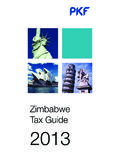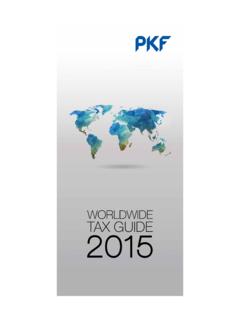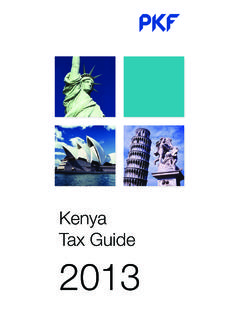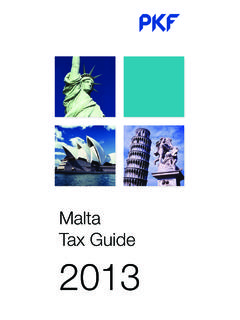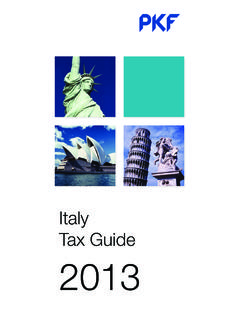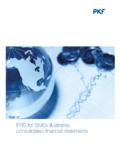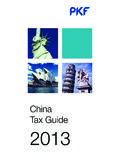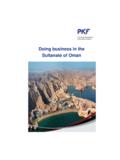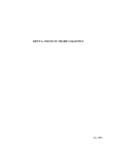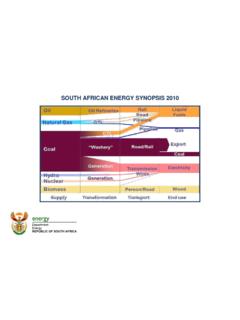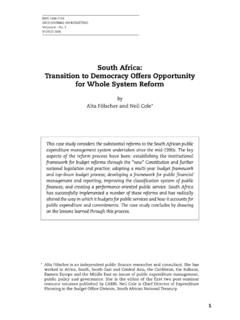Transcription of South Africa - PKF International
1 2016/17 South Africa PKF Worldwide Tax Guide 2016/17 1 FOREWORD A country's tax regime is always a key factor for any business considering moving into new markets. What is the corporate tax rate? Are there any incentives for overseas businesses? Are there double tax treaties in place? How will foreign source income be taxed? Since 1994, the PKF network of independent member firms, administered by PKF International Limited, has produced the PKF Worldwide Tax Guide (WWTG) to provide International businesses with the answers to these key tax questions. As you will appreciate, the production of the WWTG is a huge team effort and we would like to thank all tax experts within PKF member firms who gave up their time to contribute the vital information on their country's taxes that forms the heart of this publication.
2 The PKF Worldwide Tax Guide 2016/17 (WWTG) is an annual publication that provides an overview of the taxation and business regulation regimes of the world's most significant trading countries. In compiling this publication, member firms of the PKF network have based their summaries on information current on 30 April 2016, while also noting imminent changes where necessary. On a country-by-country basis, each summary such as this one, addresses the major taxes applicable to business; how taxable income is determined; sundry other related taxation and business issues; and the country's personal tax regime. The final section of each country summary sets out the Double Tax Treaty and Non-Treaty rates of tax withholding relating to the payment of dividends, interest, royalties and other related payments. While the WWTG should not to be regarded as offering a complete explanation of the taxation issues in each country, we hope readers will use the publication as their first point of reference and then use the services of their local PKF member firm to provide specific information and advice.
3 Services provided by member firms include: Assurance & Advisory; Financial Planning / Wealth Management; Corporate Finance; Management Consultancy; IT Consultancy; Insolvency - Corporate and Personal; Taxation; Forensic Accounting; and, Hotel Consultancy. In addition to the printed version of the WWTG, individual country taxation guides such as this are available in PDF format which can be downloaded from the PKF website at South Africa PKF Worldwide Tax Guide 2016/17 2 IMPORTANT DISCLAIMER This publication should not be regarded as offering a complete explanation of the taxation matters that are contained within this publication. This publication has been sold or distributed on the express terms and understanding that the publishers and the authors are not responsible for the results of any actions which are undertaken on the basis of the information which is contained within this publication, nor for any error in, or omission from, this publication.
4 The publishers and the authors expressly disclaim all and any liability and responsibility to any person, entity or corporation who acts or fails to act as a consequence of any reliance upon the whole or any part of the contents of this publication. Accordingly no person, entity or corporation should act or rely upon any matter or information as contained or implied within this publication without first obtaining advice from an appropriately qualified professional person or firm of advisors, and ensuring that such advice specifically relates to their particular circumstances. PKF International Limited (PKFI) administers a family of legally independent firms. Neither PKFI nor the member firms of the network generally accept any responsibility or liability for the actions or inactions of any individual member or correspondent firm or firms. PKF International LIMITED JUNE 2016 PKF International LIMITED All RIGHTS RESERVED USE APPROVED WITH ATTRIBUTION South Africa PKF Worldwide Tax Guide 2016/17 3 STRUCTURE OF COUNTRY DESCRIPTIONS A.
5 TAXES PAYABLE COMPANY TAX TRUSTS CAPITAL GAINS TAX (CGT) BRANCH PROFITS TAX DIVIDENDS TAX (DT) VALUE ADDED TAX (VAT) FRINGE BENEFITS TAX DONATIONS TAX SECURITIES TRANSFER TAX TRANSFER DUTY OTHER TAXES B. DETERMINATION OF TAXABLE INCOME CAPITAL ALLOWANCES STOCK / INVENTORY RESEARCH AND DEVELOPMENT EXPENDITURE INTELLECTUAL PROPERTY INTEREST AND FINANCE CHARGES TAX LOSSES INTEREST RECEIVED FOREIGN SOURCED INCOME TAX INCENTIVES C. FOREIGN TAX RELIEF D. CORPORATE GROUPS E. RELATED PARTY TRANSACTIONS F. WITHHOLDING TAXES G. EXCHANGE CONTROL H. PERSONAL TAX DEEMED EMPLOYEES I. TREATY AND NON-TREATY WITHHOLDING TAX RATES South Africa PKF Worldwide Tax Guide 2016/17 4 MEMBER FIRM For further advice or information please contact.
6 City Name Contact Information Cape Town Jan Kotze +27 21 914 8880 Constantia Valley Kobus Nell +27 21 713 8400 Durban Paul Gering +27 31 573 5000 Durban Kubashni Moodley +27 31 573 5000 Gauteng (East Rand) Henico Schalekamp +27 41 398 5600 Gauteng (West Rand) Josua Pietersen +27 41 398 5600 Knysna Bart de Nil +27 44 382 6746 Port Elizabeth Errol Reed +27 41 398 5600 Saldanha Francois Hofmeyr +27 22 714 1981 Welkom Roland Heiriss +27 57 353 2601/2 BASIC FACTS Full name: Republic of South Africa Capital: Pretoria (executive), Bloemfontein (judicial), Cape Town (legislative) Main languages: Afrikaans, Northern Sotho, English, Southern Ndebele, Southern Sotho, Swazi, Tsonga, Tswana, Venda, Xhosa, Zulu Population: million (2014 estimate) Major religions: Christianity, Islam, Indigenous beliefs Monetary unit: South African Rand (ZAR) Internet domain.
7 Za Int. dialling code: +27 KEY TAX POINTS Resident companies are generally taxed on their worldwide income. Non-resident companies are taxed on their South Africa -sourced income. Dividends paid or that become payable by a South African company to a shareholder are subject to a 15% withholding tax. Withholding tax is not levied however on dividends paid to another South African company and dividends paid by headquarter companies. Where a branch of a foreign company operates in South Africa , a branch profits tax at the rate of 28% of taxable income applies. VAT is imposed at 14% on most goods and services supplied by a vendor. Exports are zero-rated and very few exemptions exist. South Africa PKF Worldwide Tax Guide 2016/17 5 Employees are taxed on the value of fringe benefits as determined in accordance with a separate schedule to the Income Tax Act.
8 Although group taxation is not applicable, corporate rules provide relief in respect of transactions between group companies and between founding shareholders and their company. The South African Revenue Services are empowered to make adjustments to cross-border transactions between related parties that are not conducted on arm's length terms. While no specific thin capitalisation rules apply, the normal arm's length transfer pricing principle applies in respect of loans as well. Royalty and similar income are subject to withholding taxes at source at a rate of 15% (effective 1 January 2015). Royalties paid by headquarter companies are exempt from the withholding tax. A 15% withholding tax applies to dividends earned by non-residents and a 15% withholding is also applicable to dividends in specie (where the company declaring the dividends will be liable for the tax).
9 A 15% withholding tax on interest paid or payable to non-residents was imposed from 1 March 2015. Notable exclusions include interest paid on so-called portfolio debt capital, government bonds, listed securities, debts owing by local banks, domestic brokerage accounts, etc., International bank finance and interest paid by a headquarter company. Resident individuals are generally subject to personal income tax on their worldwide income irrespective of the source. Non-resident individuals are generally subject to tax on their South Africa -sourced income only. A. TAXES PAYABLE COMPANY TAX A company is resident in South Africa (SA) if it is incorporated, formed or established in SA or has its place of effective management (day to day management) in SA. Subject to certain limited exemptions, South African resident companies and close corporations (companies) are taxed on their worldwide income.
10 Furthermore, and again subject to certain exemptions, the International anti-avoidance practice of taxing income earned by Controlled Foreign Companies (CFCs) applies to South African residents. Normal tax is payable by South African companies on their worldwide taxable income at the rate of 28%. The tax is payable by both public and private companies as well as close corporations. Small business corporations are close corporations and private companies with only natural persons as shareholders, gross income of less than R20 million during a year of assessment, and where not more than 20% of its gross income consists of investment income or income from the rendering of a personal service. These corporations qualify for taxation at the following rates in respect of the years of assessment ending between 1 April 2016 and 31 March 2017: Taxable income Rates of tax R0 R 75 000 Nil R75 001 R365 000 7% of the amount over R75 000 R365 001 R550 000 R550 001 + R20 300 + 21% of the amount over R365 000 R59 150 + 28% of the amount over R550 000 Life assurers are taxed according to the four fund approach.
